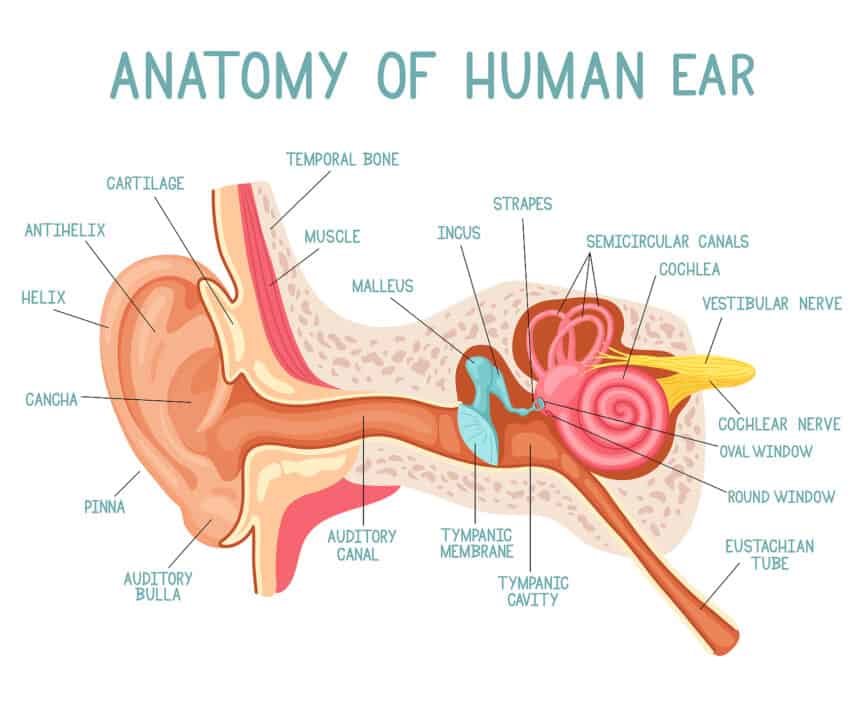“You are what you eat” is a popular saying but what does it even mean? Well, quite simply – If you eat good food, you will be healthy, if you eat bad food, you will be unhealthy. What is good and bad food anyhow?!
Plants from the earth and the creatures which consume those plants are rich with nutrients, minerals, and vitamins. They support all sort of functions throughout our body and give our body energy. This includes the mussels, joints, heart, and brain. But did you know that your ears rely on important nutrients as well?
How Food Supports Our Ears
We collect sound with our ears but listening and processing sound occurs in our brains. However, for sound to reach our brain it must be delivered via tiny and fragile hair cells called stereocilia. Stereocilia transform audio waves of sound into electrical impulses which are able to be read by our brain. Our cells rely on a healthy supply of blood throughout our body, and this includes the stereocilia as well. When they don’t receive the nutrients, they need they are far more prone to damage or destruction, leaving us with lasting hearing damage.
There are all sorts of ways to protect your hearing, so if you are already wearing hearing protection in noisy places and lowering the volume when you can, it makes sense to eat a balanced diet as well. You might support some other functions of your health while your at it! Here are some essential vitamins and mineral to prioritize:
Vitamins A, B, C, and E
In combination with minerals like iron and zinc, these nutrients work together to protect against ear infections. Children are especially prone to ear infecctions due to smaller ear canals and avoiding infection at an early age can help to support healthier hearing later in life. Find vitamins ABC in leafy greens, squash, tomatoes, dairy, fish oil and eggs. Find zinc and iron from foods such as dark chocolate, lentils, beef, cashew, pork and almonds.
Vitamin D
Vitamin D is essential is supporting bone loss and you don’t usually absorb it from the food you eat but from the sun. there are tiny bones in the middle ear called ossicles which transmit sound vibrations to the cochlea of the inner ear. Support your ossicles by spending time out in the sun. However, if you can’t get enough sun, make sure to take a supplement daily.
Vitamin B9, Folic Acid and Folate
These vitamins play a huge role in the growth of new cells and improve circulation throughout the body. This is essential for supporting the stereocilia and making sure they get the nutrients they need to stay strong.
Magnesium
Magnesium helps your tight muscles relax, but it can also aid in protecting your body from the production of free radicals. Free radicals are oxygen-containing molecules with an uneven number of electrons and in high does can contribute to diabetes, heart disease and cancer. Some research has discovered that the body may produce more free radicals whenever the body is exposed to loud noise, putting the stereocilia and cochlea at risk. To protect your ears, get magnesium from a hot bath, but also from broccoli, artichokes, potatoes, and bananas.
Potassium
Potassium aids in the absorption and regulation of fluid throughout the body’s tissue and blood. Plenty of potassium in your diet, means healthier blood and cells throughout and of course this includes the ears! The inner ear holds fluid which aids in equilibrium, balance and the delivery of sound to your brain. Add potassium-rich foods to your diet including potatoes, banana, lima beans, spinach, apricots and raisins.
Taking Care of Your Hearing
It’s a safe bet to avoid excessive alcohol, sugar processed foods and those with excessive fat content on a regular basis. Every now and then it’s okay to indulge. In the meantime, if you suspect you have some hearing loss, in conjunction with a healthy diet and plenty of exercise, it’s a good idea to schedule a hearing exam. Call today to schedule a hearing exam. We will inspect your ears and help you find the best solution for all your hearing needs.

